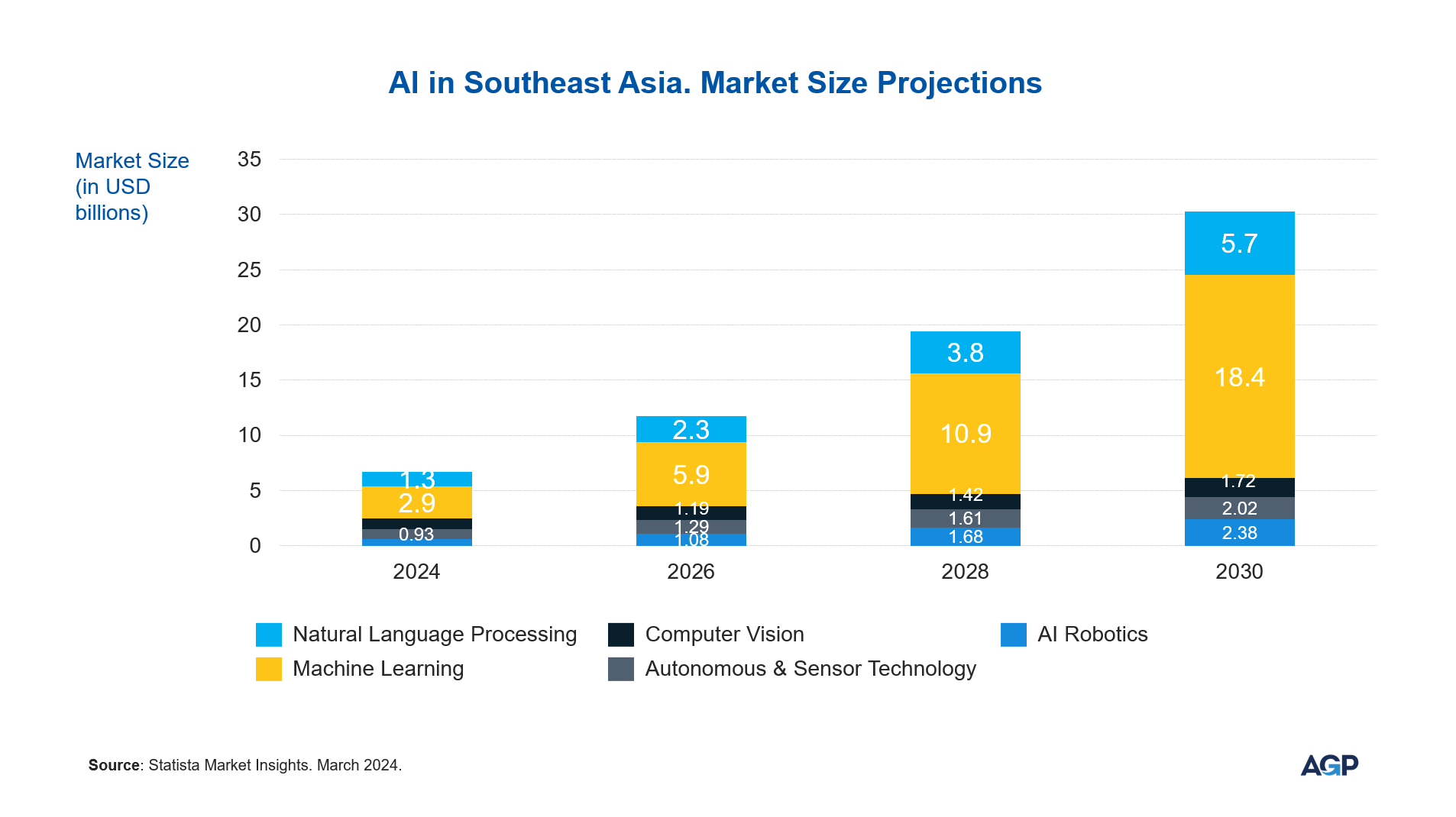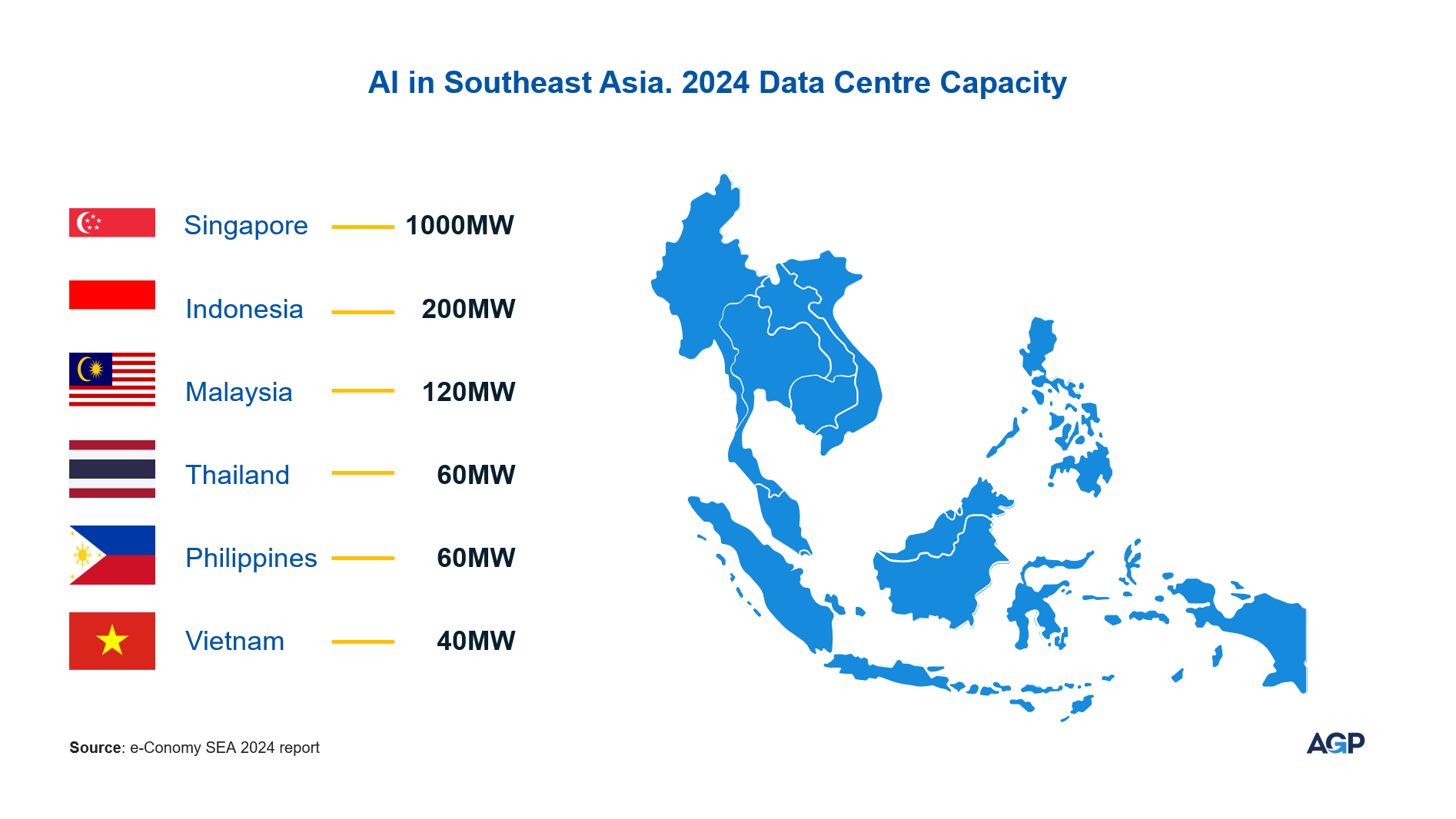Southeast Asia’s AI Boom: Progress, Pitfalls, and the Road Ahead
Southeast Asia (SEA) is positioning itself as a leading hub for artificial intelligence (AI) and digital innovation. With projections indicating a sixfold growth in its AI market to $30.3 billion by 2030, the region’s combination of youthful demographics, government support, and expanding digital economies creates a fertile ground for advancements in AI. Yet, alongside this growth lies a complex web of challenges, from infrastructure gaps to ethical considerations.
The AI Market: A Rapidly Expanding Ecosystem
Southeast Asia (SEA) is positioning itself as a leading hub for artificial intelligence (AI) and digital innovation. With projections indicating a sixfold growth in its AI market to $30.3 billion by 2030 (source: Statista Market Insights).

Machine Learning and NLP at the Forefront
Machine Learning (ML) and Natural Language Processing (NLP) are driving SEA’s AI transformation. ML, valued at $2.9 billion in 2024, is expected to grow to $18.4 billion by 2030, driven by its applications in healthcare, logistics, and financial technology. Predictive analytics and fraud detection, core components of ML, are enabling businesses to streamline operations and enhance decision-making processes.
NLP, on the other hand, valued at $1.3 billion in 2024, its market share is forecast to grow to $5.7 billion by 2030. AI-driven tools like chatbots, virtual assistants, and real-time translation services are now integral to customer service in SEA’s linguistically diverse markets. The rise of AI in these domains underscores its potential to redefine how businesses operate in the region.
A subset of ML, Generative AI (GenAI) is a rapidly emerging technology shaping SEA’s creative and professional sectors. Beyond producing text, images, and videos, GenAI is advancing in complex tasks such as common-sense reasoning and basic code generation. According to the e-Conomy SEA 2024 report, 71% of GenAI workflows in SEA businesses generate returns on investment within 12 months, highlighting its capacity to deliver tangible value in a short span.
Data Centers: The Pillars for Digital Growth
SEA is set to become the world’s third-largest hub for data centers by 2027, trailing only the United States and China. Singapore, Malaysia, and Indonesia are leading this charge with investments aimed at supporting their digital economies.
Singapore, for instance, has a detailed roadmap to add 300MW of capacity to its current data center operations (1000 MW, as of 2024), with plans to use biofuels and advanced solar technologies. However, limited space and ongoing dependence on natural gas pose obstacles to fully scaling renewable energy solutions.
In Thailand, the government is running a pilot project to allow direct renewable energy purchases, bypassing the publicly managed utility service provider; and in Malaysia, Johor (a state in the south of the Malay Peninsula) is gaining attention as an emerging AI hub, attracting investments from companies like ByteDance and Microsoft.

The Energy Challenge
Despite significant investments, the energy demands of AI-powered data centers remain a pressing challenge. AI applications require extensive computational resources, creating immense pressure on SEA’s power grids.
While the region boasts abundant renewable energy potential, with solar and hydropower leading the way, inefficiencies in energy storage and transmission remain obstacles. The energy landscape across SEA varies significantly, with some countries benefiting from stable and reliable grids while others continue to experience blackouts. Regional collaborations, such as Singapore’s plans to import renewable energy from neighboring countries via subsea cables, highlight innovative solutions to these challenges.
Economic and Social Impacts of AI in SEA
Job Creation and Skill Development
The rise of AI in SEA will create thousands of jobs in high-demand fields like data science, software development, and AI ethics. However, a significant talent gap persists. Only 19% of ASEAN businesses are fully prepared to leverage AI - according to Cisco's 2024 AI Readiness Index, underscoring the need for strategic investments in education and reskilling initiatives. Governments and private entities must collaborate to nurture a skilled workforce capable of meeting the growing demands of the AI ecosystem.
Boosting Startups and Innovation
SEA’s dynamic startup ecosystem plays a critical role in addressing local challenges through AI-driven solutions. From fintech to e-commerce and healthcare, startups are leveraging AI to solve pressing issues, attracting sustained venture capital in the process.
The region’s geopolitical stability and supportive policies further enhance its appeal as a destination for global investors seeking opportunities in AI innovation.
The Way Forward
Infrastructure and Readiness
While SEA’s AI market is expanding rapidly, infrastructure gaps pose significant challenges. High-performance computing capabilities, robust cloud infrastructure, and scalable storage solutions are critical for managing the increasing demands of AI workloads.
Ethical Considerations
As AI adoption accelerates, questions surrounding data privacy, algorithmic bias, and ethical governance are becoming more urgent. Policymakers must establish clear frameworks to address these concerns while promoting transparency and accountability in AI development and deployment.
Final Word
Southeast Asia’s AI ecosystem stands at a pivotal moment, characterized by transformative potential and a complex array of challenges. From driving economic growth to creating jobs and fostering innovation, AI has the potential to transform the region.
However, addressing infrastructure gaps, talent shortages, and ethical concerns will be crucial to realizing this potential. By leveraging its strengths and implementing forward-thinking policies, SEA can establish itself as a global leader in AI.
Related Insights.











